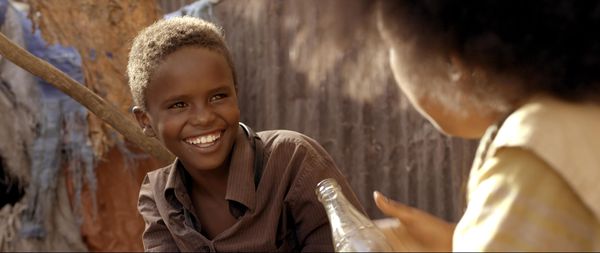 |
| Looking to the future in Running Against The Wind Photo: Yenefasu Felemia |
The story of two boys whose destinies diverge as each pursues his passion, Running Against The Wind was Ethiopia’s entry for Best Film not in the English Language at the 2020 Oscars. It’s now out on on Blu-ray in the UK and enjoying a cinematic release in the US. It stems from an idea which German director Jan Philipp Weyl had over a decade ago as a high schooler, when he was invited to Ethiopia by the actor and philanthropist Karlheinz Böhm. When we connected to discuss the film, he explained how it happened.
“I collected more than €23,000, starting from eighth grade, in order to build a school in Ethiopia. Back then, you know, it was a different time. There was no social media yet. It was me and my friend, we we kept on going selling cakes and chocolates in the school breaks in high school, pretty much out of the blue. We had all this money and then he came to our school and invited us to Ethiopia to see Ethiopians there, the project of Menschen für Menschen.”
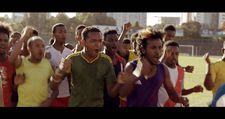 |
| The race is on Photo: Yenefasu Felemia |
This led to him getting to know the village where the film’s main characters, Solomon (Mikias Wolde) and Abdi (Ashenafi Nigusu) start out.
“It's far away from Western civilisation. There was no electricity. And that's the place where the first school was built, back in 2008. When I was there with the digital camera, all the kids were crazy about it, to see themselves on the display of the camera. It made me come up with the idea of those two characters, those two little kids from the village, and one is trying to become a photo maker, the other is trying to become a runner.”
The film starts off by showing us an image of the country which Westerners are familiar with – foreigners doing charity work there – but then follows the kids and becomes their own story. Jan explains that it was important to him to tell a story which focused on Ethiopian people themselves.
”If you remember back in 2003, 2004 or 2005, those were the years when the first digital cameras came in, it was kind of big deal, right? From analogue to digital. And it's already became a kind of stereotype, you know: there's any kind of indigenous ethnic group, far away from Western civilization, and then, at a certain point, there's the photographer who comes there and brings this Western technology, white people coming to Africa and developing it. Throughout all these years in writing and producing the film, I created - I mean, it's a character, which is not really creative because it's based on true events, the character who I perform, it's based on, like, half of my life in Ethiopia, and another half on another character and a real person. I wanted to create this kind of anti white saviour.
“I always get the idea of the anti white Saviour, you know, of this guy who was actually the one who receives help from those two kids, and by saying so, I reduced it to a minimum, so there was the sequence of five minutes, which was supposed to be in the film, which we took out in the, in the final editing stage, because if we had this kind of anti white saviour the way I really wrote it, the way I shot it, and we had put it in the film, it's never rated 15, you know? So it was a really tough topic. And I reduced it to the minimum so that there's still this little bit of the character in it but he’s not the one who did any photographs. He's just the one who believes in the talent of the young kid. And that's all he does... It has nothing to do with any help. Because those two characters, they help themselves. And I think that's very clear. And and I've wanted to come up with this kind of anti white saviour because I've never seen this kind of character in a movie.”
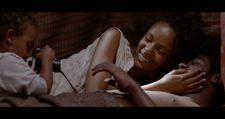 |
| The joys of family life Photo: Yenefasu Felemia |
Having one of the boys become a photographer seems like a very literal way of showing us his perspective, I suggest.
“Yeah,” he says. “It was all about the idea that there's a Western photographer who has an exhibition of homeless people, of his country, in one of the poorest countries in the world. That was the original idea, you know? The photographs are from the UK, from the English photographer Lee Jeffries. This Western photography is portraying the poorest people, who live on the street. And the approach of Solomon is to do the same, but to see all the richness. And that was this kind of poetic approach.
“How do you portray any kind of poverty? How do you portray any kind of richness? I don't think in this kind of categories, because I just think in the way, okay, what will be the most realistic and the most truthful to the character? If you grew up on the streets of Addis Ababa and if you were in your early 20s, if you truly have the wish to become a photographer, you take pictures of your environment. We take pictures of whatever there is. It's not that Solomon thinks ‘What kind of life are we living in? We are working as garbage men and there's nothing worse, for portraying, you know, there's nothing more annoying.’ It's the opposite. He sees all this kind of richness. And this is what, again, comes from deep inside of me, because of when I was in Ethiopia as a 18-year-old, I grew up as a 14 year old, starting to collect donations, literally being told and being taught that Ethiopia is one of the poorest countries, and then I come there by the age of 18 and everywhere I look around me, I only see richness, you know, like, in the people, in the culture. You know, it made me so angry that I had to do this movie, even though it was like 10 years in order to get the movie done.”
It's a very beautiful film, I note, particularly with its rural landscapes, Did he want to show outsiders that Ethiopia is much more diverse, visually, and much more interesting to look at than some of the things we generally see in news programmes in the West?
“Yes. With my experiences of 16 years in Ethiopia, I believe that Ethiopia is one of the countries which is entirely portrayed wrong by the media. It has several reasons, which are very pragmatic. It's simply because there is no foreign country making any emphasis on putting a proper team of journalists into the country to have a proper correspondence. And it's not any kind of criticism, it's just the fact – every journalist knows this – there's no budget, and it's very common that there is one journalist taking care of 20 or more countries. It's simply the way it is.
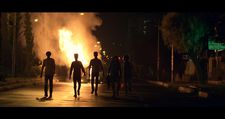 |
| The end of a joyride Photo: Yenefasu Felemia |
“Whatever the news is about Ethiopia, Ethiopia is one of the poorest countries. And on TV, whatever it is. It's not even close to any kind of reality. It's not even close. So my approach to make the film was actually really, really trivial. I simply wanted to make a film about Ethiopia the way I feel, and then I created those two characters, and wrote the story, and then I simply went with every kind of film technique which I thought is helpful to make the audience understand what kind of environment they are living in. I always said, there are actually three main actors, you know, it's Solomon, Abdi and Ethiopia.”
Was there a personal aspect for him in telling the story of a photographer – did it relate to the way that he came to film?
“Yeah, of course. I started photography when I was 12. And my father had a very proper camera back then, which is very, very well known camera, the Canon AE1 It's beautiful journalist camera, and so many important pictures have been taken on this camera. My father gave it to me when I was 12 and he said ‘Everything that belongs to me also belongs to you.’ So I had this camera and I started taking photographs. And then the DOP of the film, Mateusz Smolka, we grew up together, we pretty much spent our entire life together so far. And we had a competition between 13 and 18, who is taking more photographs. So it was all about photography. I want to become a filmmaker since I'm a little child. But I was taking photographs like crazy and I stopped taking photographs by the age of 18. Because what were probably the best photographs I ever took were stolen. And after that I never touched the camera.”
So what about the running side of it? While Solomon is pursuing his ambitions as a photographer, Abdi is pursuing a career as an athlete. Jan’s next film will be about a marathon runner Terry Hitchcock. How did he get into that?
“I did sport my entire life,” he says. “I played every kind of ball sport, tennis and hockey and football and volleyball and all this and I was never into into running. But I got into running through Ethiopia, because you know, I mean, like football in the UK and Germany, you know, football is number one, right? And what's football in our countries, it's running in Ethiopia. And there's an entire lifestyle which is all about running. There are generations...having that dream, you know, of running and becoming a running star, because it's a fantastic way of making a living, right? You become famous and you run all over the world, you know, you run for your country, you run outside of your country.
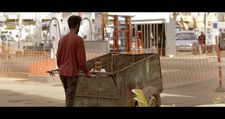 |
| A job's a job, for a' that Photo: Yenefasu Felemia |
“I had the idea in Germany, of course, but then in 2008 I went to Ethiopia and I wrote the script. I've been there for nine months only for the script research and for the for writing the first draft. That's when I started to interview runners, to train with runners and to really get into the elite of Ethiopia's runners. I was interviewing and spending a lot of time with the team of candidates. I got to know Haile Gebrselassie, and then I also started running. I thought it's important to understand about the distances. I did all the really back end research, you know, like what it is to know what kind of distance you run, because running is not just running. Once you're in it, it’s all about the distances, how you train. And I've been into all this. I've been running myself for three years straight.”
Overall, he says, the biggest challenge involved in making the film was casting.
“The entire casting process has been a process of eight months in total, which have been but not eight months straight. The first approach was that I said, okay, it's all about the cast, and it's all about the fact that it's impossible to find film actors to Ethiopia. There are several stage actors but there is no one with the experience I have been looking for. So I knew that I really had to make the film, you know, by finding people and making them actors.
”So the casting I did in the line of City Of God. City Of God I've seen when I was 16. I've watched the film and said ‘I must do something like this.’ So Fernando Meirelles yesterday literally changed my life. And I started the casting process to find out if it's possible to do the film with non actors. We started casting the switchover, you know, like every week cast more than 600 – I always used to say kids, but there were kids and also adults – and I cast more than 800 runners, you know, from professionals to amateurs. And then, throughout the main casting process, we cast, from 2014 on, 603 kids, and then the main casting really close before the shooting.
“Out of this, I mean, we stopped counting with 4000 I think it was like 4200 people or something. And we went everywhere, we gave away flyers on the streets. There was the theatre stage of the Addis Ababa University, of the Art School of the University, where we did the entire audition. So we have more than 4000 people for the performance on photographs, then we did videos, and then out of the videos, we said, okay, we’ll do auditions, and we make this 600 people, then we went down to 250. And then we started getting the first dry rehearsal. So those are 250 people, we gave scenes that were acting throughout the period of the first four weeks, then the second month of the audition. We needed a lot of a lot of speaking roles, right, more than 50 speaking roles.”
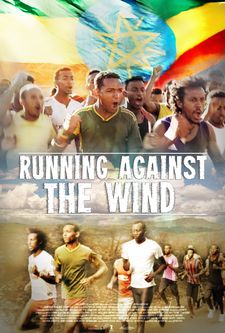 |
| Running Against The Wind poster |
One of the difficulties, he says, was finding people who were not just capable actors but were committed enough to the project for him to be confident that they’d turn up on the day, because with no established film culture, nothing could be taken for granted. Now, however, the hope is that this project will have sown the seeds of a new Ethiopian industry – and it’s already launching careers.
“The pandemic literally closed everything,” Jan says. “But I mean, however, Mikias Wolde was nominated for the Best Newcomer – the first time in over 20 years of history that an African actor has been nominated for Best German Newcomer. The guy really has ambitions. They are really working. And what's really very beautiful is that the little kids, I brought them to Don Bosco, which is a worldwide organisation, and they went to school and they're fluent in English. Little Joker [Eyob Engeda] is now 18 years old, has his driving licence, you know, and I mean, it's really beautiful. Because, I mean, I wouldn't say it wasn't my dream, but I was always hoping and willing to do anything to help them, you know, because if there's a kid, with nothing, but only the clothes he's wearing, what really changed his life and what I can do is getting him on and making him understand that education is what's necessary. And this is what happened to those kids, and I'm really happy about it.”
The other big unexpected reward to come from all this work was having the film put forward as Ethiopia’s submission to the Oscars.
“Yeah, it was really the biggest potential honour. The former Minister of Culture, who was by then in, in February 2019, the Minister of Education and Science, she had been asking to see the film while she was on a trip in Germany. She had heard about the film because it was one of the biggest production in Ethiopia. She saw the movie, she went out of the out of the cinema, and she was brought to tears. And she literally told me to go and show this film to her colleagues, to the Minister of Culture. And then it was like in a movie, you know? We watched the movie on the Thursday. Saturday we spent on the plane together with her. On Monday morning, 830, we've been at the office of the Minister of Culture in Addis Ababa in Ethiopia. And then they took it so serious. The senior experts from the Ministry of Culture, they all watched and related to film and it was so nice.
The consequences of them disliking the film and deciding it presented a negative image of the country could have been severe for him, he explains. “But somehow, they all watched my film, they all got the intention. And I remember I was just sitting there in a suit with a tie, you know, and then the senior experts started talking in Amharic. And they were saying, so many things about the film, and at a certain time, I was just crying like a little child. And it was really very, very beautiful. They wrote a letter to the Academy in Los Angeles, stating why there was me as a foreigner – as an Ethiopian resident but as a foreigner, you can't become an Ethiopian – and how come there's a German citizen who is representing Ethiopia.
“It was really the greatest honour. It's a very personal thing. But what's really beautiful to have this backing from the Minister of Culture is that it has taken so much time and involved so many people. So, you know, from the Ethiopian film community, you know, there is no industry but there's a community and some people who do film in Ethiopia and that is really respected. We've been chosen for it, and we made everything possible, There was nobody from the Minister of Culture who ever did this before, there was no one with experience. Together with the director of the Ministry of Culture, we worked more than 200 hours on the submission process. There were five people involved, plus the Academy. There was an ongoing over three months that the director was communicating with us and the Academy, that we had to get all the material ready, and that was a lot of work.
“I'm so happy that we made it because we made the way, we built the roads for every future Ethiopian filmmaker to do so. That's something I'm really proud of. In my field, with Ethiopia's first official Oscar contender, I know that whenever there is the next one, they're going to come back to us. And we're going to bring Ethiopia to the next Oscar consideration.”





















